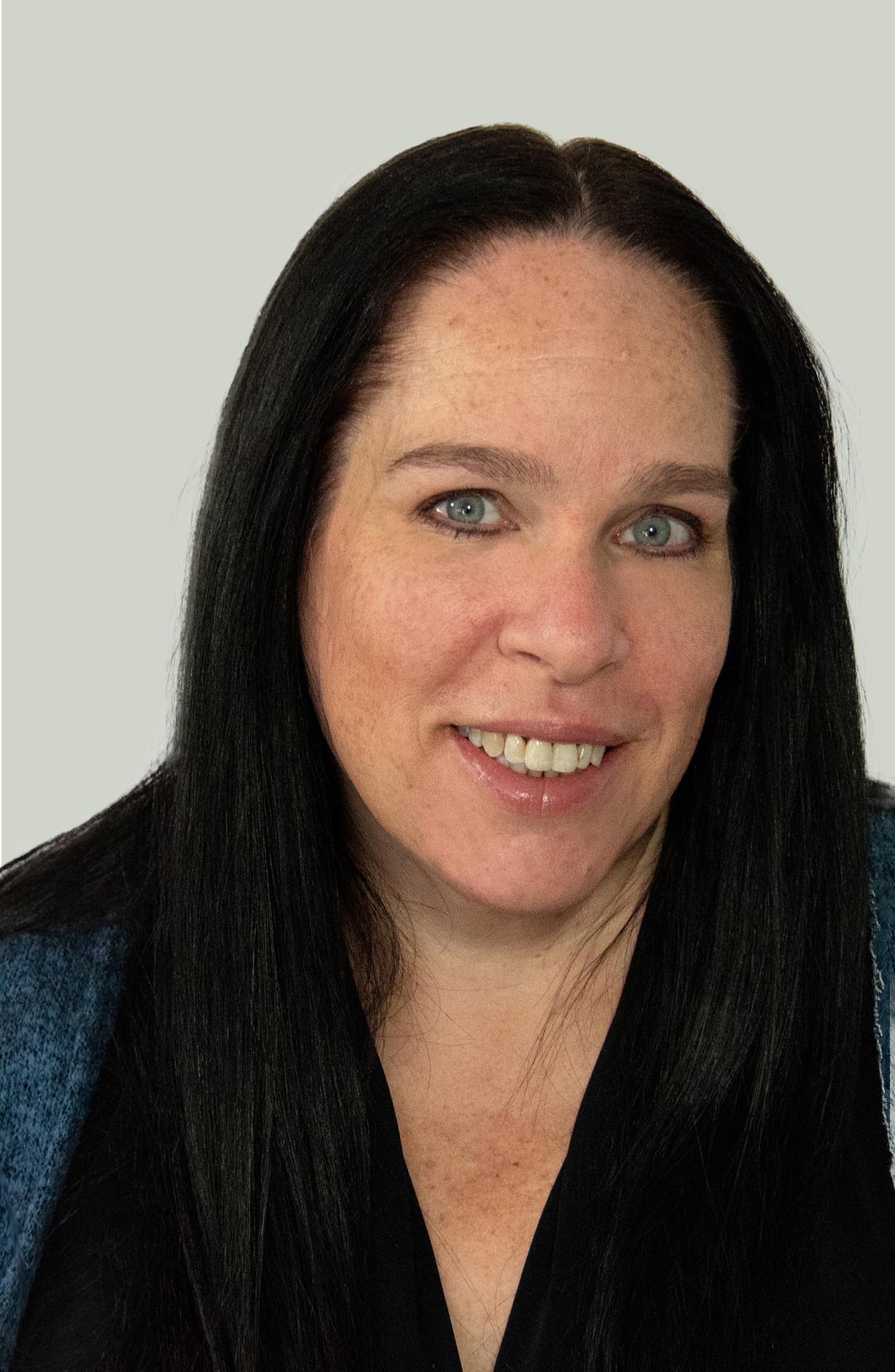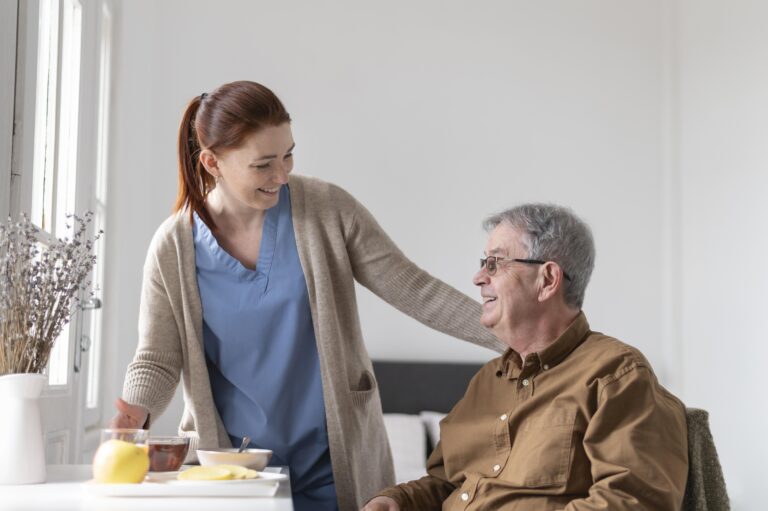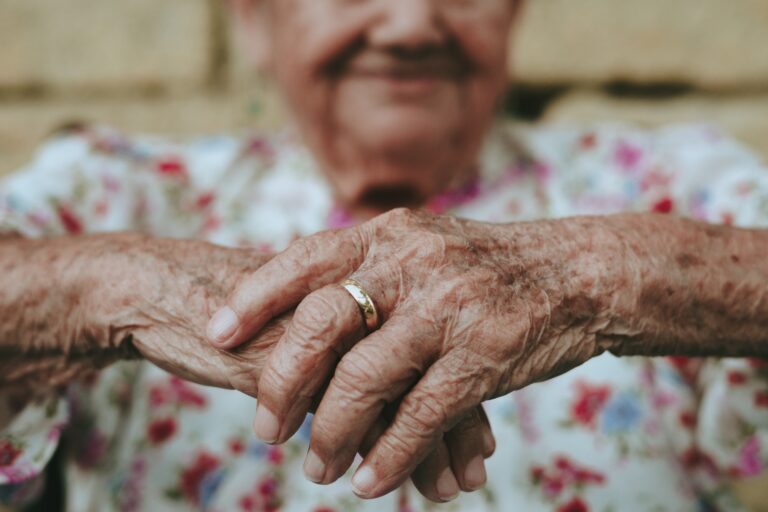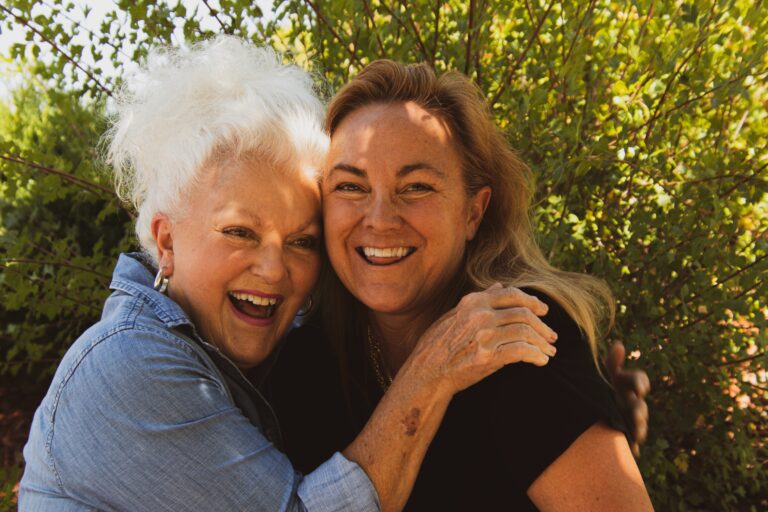I was 3 years old when I was first introduced to the Senior Care industry. My mom took a job working the switchboard at a senior nursing home in Coney Island, Brooklyn. I grew up around all these amazing and compassionate people who cared for all these seniors. As a teenager, I started my first job working with seniors in that nursing home. From there, my career has included working with seniors in hospitals, rehabilitation centers, assisted living, memory care, independent living and now senior home care. What they all have in common is the role these caregivers can play in the lives of seniors and their families. Of course, it is about finding those caregivers and helpers with the right heart.
What are Caregivers for Seniors and Home Care Aides?
Caregivers and home helpers for seniors or those with dementia, provide comprehensive elder care services by overseeing a wide variety of activities, from everyday chores to offering emotional support. Every day, my goal is to bring a smile to a seniors face. These dedicated caregivers don’t only offer their assistance, they offer their companionship and empathy as well, enriching each day with the individual attention that underscores a better quality of life for the elderly. Indeed, this recognition of the commitment made by caregivers and senior helpers rings true to our goal to provide seniors with the dignified, high-quality support they need.
The Role of Caregivers in Elderly Care
In providing care to seniors, caregivers and home helpers don’t just substantiate the difficulties faced by family caregivers; this care model plays a big part in alleviating their stress and hardships. By helping with various day-to-day activities, these compassionate caregivers allow a senior’s children, grandchildren, and extended family to hold on to their lives as they always have. What’s more, they supply seniors with the emotional support and camaraderie that mitigates the physical health risks associated with loneliness and depression. Ultimately, caregivers help family members meet their most pressing priority: giving their aging loved ones a high quality of life.
The peace of mind of not having to worry about a family member is everything. That’s the benefit of knowing they are in the hands of a caregiver that is detail oriented and has a vast history in taking care of the elderly.
It is the diverse roles that caregivers and home helpers for seniors play that makes them so central to elderly care. Their ability to switch from providing companionship, to aiding with daily activities, to offering crucial emotional support, creates a home care approach that is unique to the specific needs of each individual.
This versatility is particularly important in the presence of the evolving health conditions of many seniors. Home Care agencies are very adaptable. They are able to adjust the amount of care they are providing to meet a senior’s needs at that exact moment. They also serve as the vital liaisons in the healthcare system, working closely with healthcare professionals to ensure that the care procedures and plans are synchronized. This is so essential in order to make certain that care procedures and strategies, set by health professionals, work seamlessly together.
The Vital Role Caregivers for Seniors Play In Extending Health Services
Caregivers and home care aides are the backbone in extending the continuum of professional health care services right in a senior’s own home. By providing a consistent level of in-home care that corresponds with the advice of health professionals, they are able to make sure that seniors are not visiting the hospital on a regular basis. Particularly, as the daily observer of a senior’s health and well-being, caregivers are perfectly situated to watch out for any change in a senior’s condition that requires the timely intervention of health professionals.
It is also a fact that caregivers, and their home care agencies, are actively involved in following through care plans set up by a senior care expert. In doing so, they are also serving as the bridge that spans the ‘care’ cavern between that of health advice and healthy living. As a result, caregivers are providing the holistic kind of care that matches the complete care requirements of seniors.
Roles and Responsibilities of Senior Caregivers
Daily Care and Assistance
Caregivers and home care aides ensure that seniors receive the daily care and assistance they need to live comfortably and safely in their own homes. This includes performing household tasks such as cleaning, laundry, and shopping so that seniors can live in a clean and comfortable environment. Caregivers also provide mobility assistance, helping seniors to move about their homes safely and reducing the risk of falls or injuries. It’s essential for a caregiver to help maintain the personal hygiene and grooming of their senior clients, which may include helping with bathing, dressing, and grooming. This is important not only to a senior’s physical well-being, but to their sense of dignity and self-esteem as well.
Health and Medical Support
In addition to daily care that helps seniors live comfortably, caregivers also assist seniors by providing vital health and medical support. These tasks include assisting a senior with medication management as per his or her personalized and prescribed medication schedule, as well as managing the overall health requirements of a senior. Regular health monitoring by senior caregivers and home care aides is also critical to managing the health conditions of seniors, with any changes in health reported promptly to healthcare professionals, for immediate assessment and necessary action.
Emotional Support and Companionship
The emotional support and companionship provided by caregivers and home care aides have an immense impact on the mental health of seniors. By being there emotionally, they can affect the mental and emotional well-being of seniors in a positive manner. Caregivers ensure that seniors stay engaged and as socially active as possible and help minimize the often crippling effects of senior isolation. The establishment of a trusted and friendly relationship with seniors is an extremely important aspect of the responsibilities of senior caregivers and home care aides, and senior caregivers are more than a caregiver, but a trusted friend assisting with the quality of life of their senior client.
Ensuring Safety and Security
Caregivers and home care aides are also responsible for ensuring the safety and security of seniors in several different aspects. Checking the home for any safety issues that may be present, and removing them where possible, is essential to reduce the risk of injury or worse for seniors who may be at risk of falling or sustaining other injuries. Falls in the home are common and, with the assistance of caregivers and home care aides, a senior’s risk of falling and potentially injuring themselves is reduced. By creating a safe and secure living environment for the seniors and assisting with the needs of their daily life, caregivers and home care aides contribute greatly to the well-being and peace of mind of seniors, and their families.
Benefits of Hiring Home Care Agencies and Caregivers
Improving Quality of Life for the Elderly
Hiring a home care agency can substantially improve the quality of life for seniors. Home care agencies promote the physical health and well-being of seniors by providing daily care, health monitoring, and medical assistance when required. Moreover, their caregivers and home care aides enhance the social and emotional well-being of seniors by providing companionship and emotional support. Engaging seniors in social activities can help decrease feelings of loneliness and boost their mood. Additionally, by providing respectful and personalized care that honors the preferences and needs of each senior, caregivers and home care aides can help maintain a sense of dignity and independence among seniors.
Providing Respite for Family Caregivers
One of the primary benefits of hiring caregivers or home care aides is the respite they provide for family caregivers. Caregiving can be both stressful and overwhelming, and without regular breaks, caregivers can experience burnout. Home care agencies help family caregivers by assuming some of the caregiving responsibilities of seniors, enabling family caregivers to take a much-needed break and relax and recharge. This can also allow for family caregivers to balance their other life responsibilities, including work, family, and personal time. Furthermore, knowing that their loved ones are in the capable and caring hands of caregivers and/or home care aides can provide peace of mind to family caregivers.
Enhancing Health and Well-being
Hiring caregivers and home care aides can substantially enhance the health and well-being of seniors. They promote the physical health of seniors by providing daily care and assistance, which can significantly reduce the risk of seniors injuring themselves. The emotional support and companionship of caregivers and home care aides can have a miraculous effect on the mental health of seniors, reducing feelings of loneliness and improving their overall mood. Caregivers play a vital role in managing the health condition of seniors by monitoring their health and promptly reporting any changes in health to family members and healthcare professionals, and by sticking to the medication regimen of seniors. Their coordination with healthcare professionals ensures that seniors get the comprehensive health care they want and need.
Promoting Independence and Dignity
One of the primary benefits of hiring a home care agency is that they promote independence and dignity among seniors. By providing respectful and personalized care that honors the preferences and needs of each senior, home care agencies enable seniors to live independently for as long as possible. This significantly enhances the overall quality of life for seniors and fosters a sense of self-worth and dignity. Caregivers and home care aides provide seniors with respectful and compassionate care that acknowledges the personal dignity of each senior. By empowering seniors to live as independently as they want and are able, caregivers and home care agencies can help contribute to a more positive and enriching aging experience..
Choosing the Right Caregivers or Home Care Aides
Understanding the Needs of the Elderly Person
Understanding the needs of the elderly person is a crucial first step in choosing the right experienced caregiver. This includes their unique needs, preferences, and health conditions, which should guide the selection of a caregiver who can best meet these needs and personality. Family members and healthcare professionals can play a key role in identifying these needs through their knowledge and interactions with the elderly person. Conducting a comprehensive needs assessment can provide valuable insights into the type of care and support required, ultimately helping in choosing a caregiver who can provide the necessary care and assistance while developing an appropriate and personalized care plan.
Assessing the Skills and Experience of the Helper
Assessing the skills and experience of the caregiver or home care agency is another key step in making the right choice. The caregiver should have the necessary skills and experience to meet the specific needs of the elderly person, be it physical assistance, health monitoring, or emotional support. Training and certification are important indicators of the competence of the caregiver, ensuring that they have the knowledge and skills to provide quality care. Past experiences and references can also provide valuable insights into the capability of the home care agency, giving you confidence in your choice.
Considerations for Cultural and Personal Compatibility
Cultural and personal compatibility is a key consideration in choosing the right caregiver. A positive relationship between the caregiver and the elderly person can greatly enhance the quality of care and companionship provided. Shared interests, values, and even language can contribute to this compatibility, making the elderly person feel more comfortable and understood. The caregiver should also respect the cultural preferences and personal habits of the elderly person, further enhancing their comfort and satisfaction. By considering these aspects, you can ensure a more positive and fulfilling caregiving experience for the elderly person.
Importance of Trust and Reliability
Trust and reliability form the cornerstone of any caregiving relationship, especially when choosing the right caregiver. For seniors and their families, the peace of mind that comes from knowing they are in capable and dependable hands cannot be overstated. A consistent level of care provided by the caregiver is not just preferred—it’s imperative for effectively managing the health and day-to-day needs of the elderly.
When a caregiver demonstrates trustworthiness and reliability, it nurtures a strong bond with the senior. This, in turn, contributes to a more responsive and empathetic care environment. Trust also enables the elderly person to feel secure and confident in their living situation, easing the stresses associated with dependency and aging.
For the family, knowing that their beloved elder is looked after by someone steadfast and responsible means they can rest easier. They can be assured that schedules are adhered to, medications are administered correctly, and that the caregiver is proactively addressing the evolving needs of their elderly relative.
It’s through dependable and trustworthy care that seniors can enjoy a quality of life where dignity, respect, and well-being are upheld. Choosing a caregiver with these attributes is an indispensable step in ensuring that the golden years are as fulfilling and serene as they ought to be.
Challenges and Solutions in Utilizing Caregivers
Caregiving can be filled with ups and downs. The decision to utilize caregivers often raises concerns about privacy and autonomy. Being cared for by someone else is quite different than being cared for by family members, and caregivers must understand these differences in order to ensure a positive experience for everyone. The goal is to provide care that is personalized and respectful, while also keeping the older adult’s privacy and autonomy in line. Caregivers need to give space and be respectful while understanding and responding to the older adult’s comfort level. Additionally, open and clear communication, agreed upon boundaries, and conversation about how the older adult wishes to be addressed, all contribute to helping everyone feel comfortable and respected.
One of the greatest challenges for families is managing the cost of caregivers. It is crucial to understand the financial aspects of caregiving, and to make good decisions along the way to ensure the expense remains manageable. One of the best places to start is to breakdown the costs of different types of care, such as hourly rates for home care, long-term residential care costs, or memory care premiums. Next, it may be helpful to see what financial assistance is available. There are a myriad of resources out there, including long term care insurance, different levels of Medicaid programs, Veterans Affairs benefits, or community-based financial aid that could pay the costs of caregivers under certain conditions.
Caregiving needs to be triaged in a lot of respects. Costs need to be managed and kept in check to ensure they don’t decimate the family’s savings, whether it’s helping to set up a dedicated savings account, investing in a long-term care insurance policy, or finding ways to adjust assets so Mom can avail herself of some assistance from Medicaid so simple math doesn’t plunge everyone into ruin when she needs a helping hand more than she does today.
Managing Care Costs
Financial planning can help manage these expenses, however, and enlisting the help of professionals will not only be helpful, but ensure that your mom gets the kind of care she needs without you being forced between a rock and a hard place.
Changes in Health Status and Needs
Finding an adaptive caregiver can often feel as challenging as gardening through the seasons, in so far as the health status and needs of your elderly loved one may grow and change, essentially requiring care to follow suit.
In this case, close health monitoring will be key — it’s akin to the pulse-check that guides the care plan adjustments. As the senior’s care needs evolve, regular health monitoring becomes all the more crucial; a blood pressure that creeps up or balance or mobility disruptions during your traditional morning stroll around the neighborhood, can easily mean it’s time to double check the care routine.
The caregiver-care team dance extends to the communicative efforts between the caregiving professional and local healthcare professionals, providing the means to ensure a care coordination that responds in concert to the senior’s individual health needs as it comes to life. This coordinated care allows caregivers to proactively respond to the narrative health interests of seniors — whether that may be in the realm of medication administration, helping them maintain personal care and hygiene, or providing in-home support.
At the heart of this all is a flexible care plan, one that can bend and flex as this chapter of a senior’s life does. It’s not set in stone but written in the sands of compassion and understanding, ready for the tides of change.
Building Effective Communication and Relationships
Building effective communication and relationships is fundamental when it comes to the utilization of caregivers. The symbiosis between caregiver and the individual receiving care is of paramount importance. With open and regular communication, a care environment is cultivated where the duties of caregiving are not tasks but shared endeavors in augmenting an elder’s life quality.
Maintaining an open dialogue about the senior’s needs and preferences leads to more tailored care, assures the caregiver is apprised of any alterations in health status, which is instrumental in providing responsive and adaptive care. It’s also pivotal from the perspective of involving the seniors in their care plan, giving them a voice in the process and, thereby, preserving their dignity.
A strong caregiver relationship is the cornerstone of a positive caregiving experience such that trust is laid and in its wake, a comforting and reassuring atmosphere is born. This individual simply becomes not a helper, but more of a friend, who can not only understand but empathize with the legacy our elders offer, making a mutual journey through the twilight years of life full of reverence and mutual appreciation.
Conclusion: The Impact of caregivers on Elderly Care
Reflecting on the Benefits and Challenges
As we reflect on the journey of involving caregivers in the care of our elders, we honor the incredible difference they bring to the lives of our loved ones. Whether they are providing personal care, offering a smile and companionship or enhancing the overall quality of life of our seniors, they are keeping the health, safety and security of the wellness and the elderly first in their life, adapting as the needs of our elders change.
This said, as is the case with any aspect of senior care, we know these benefits also come with the challenges. Concerns for privacy may surface, the costs can add up and health conditions do change, necessitating flexibility. The key to navigating these challenges is the power of communication, solid relationship building and significant connection to the resources required for ongoing support. As we carry this out, the journey of involving caregivers promises to be a positive, enriching experience for all involved.
The Importance of Ongoing Support and Training for Caregivers
Offering unrivaled support for caregivers is among the most important elements in delivering the highest quality care to the elderly. Dedicated to ongoing support and training, professional development and continuous learning opportunities constitute the best way to improve people who work in elder care. The more expertise that caregivers possess, the better prepared they are to address the multitude of challenges that come up as they pour their hearts into their work. Training may be on physical care, managing medical conditions or on the art of bringing a moment of peace to the day of someone who doesn’t remember what that means.
Well-organized support systems that may involve regular supervision and feedback enable caregivers to reflect on their practices and continue to perfect their skills, so that they can align with the ever-evolving needs of those they care for. This of course ensures that the necessary and appropriate support is consistently in place. Contact us today to gain insight on enhancing your skills as a caregiver.
The Future of Caregivers in Elderly Care
Looking ahead, the future of elderly care has the potential to be transformed by caregivers. The rise of new technology and innovation (including caregiving robotscaregiving robots) will enhance the quality of service that the caregiver provides by modernizing and personalizing care. Digital health technology will help in health monitoring and communication, while advancements in the practice of the caregiver will enhance the quality of care provided. This is where research and policy support will also contribute to the role of the caregiver in elderly care. The invaluable contributions they offer should be acknowledged, as should the resources and support they need to provide continued support for our ever-growing aging population.
Final Thoughts and Recommendations
The valuable contributions that caregivers are providing to improve the lives and support of seniors as they reach the final years of life make them a critical component to any family member in any elderly person’s care program. So with this appreciation, it is important to carefully select a caregiver who is in line with the elderly individual’s needs and preferences. The family must also continue to provide a strong level of support and resources necessary for the caregiver to provide a consistent level of care, one that is able to keep with the growing and changing demands of aging. Let the caregiver do the caregiving and let the family be the family.
The journey of caregiving can be complex, challenging, and unpredictable. It’s important for caregivers to have access to support when they need it, personalized resources, and ways to make sense of and help navigate the path ahead.

From a young age, Stacey’s link to the senior care industry grew alongside her mother’s work at a nursing home, where she often accompanied her. By her early teens, she secured her first official job at a nursing home, laying the foundation for a profound journey in senior care spanning over four decades. Her roles varied from opening assisted living and memory care residences to working in nursing homes and independent senior living communities. As the former Director of Fun for 300 independent seniors, she expertly organized daily events and trips. Stacey’s unwavering passion, nurtured by her family, and professional dedication as a recreation therapist, reflect her deep commitment to preserving the dignity and well-being of seniors.
Stacey’s senior care expertise has been recognized by the media including U.S. News and World Report and Care.com.
Stacey and her husband Bryan are the owners of the senior in-home care agency A Place At Home – North Austin.




